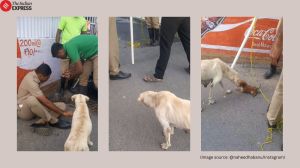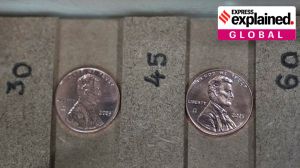Stairway to Heaven
Yellow and red, yellow and red, on 3,600 steps, across seven hills. Tirupati in midsummer burns, it's noon, what a time to start, but at ...

Yellow and red, yellow and red, on 3,600 steps, across seven hills. Tirupati in midsummer burns, it’s noon, what a time to start, but at the foot of the hill, I decide to climb. I look up. No point adding up steps in my head; it’ll never end.
Yellow and red, yellow and red: fresh sandalwood paste smeared on the rough granite steps, vermilion dots in the middle. You can almost smell the temple smells — incense, jasmine, camphor, 3,600 steps up, across seven hills.
Fifty steps are done, sweat starts wetting your back. On both sides of the ten-foot wide path is green: slender trees mostly; pinkish green, translucent baby leaves shimmering in the heat.
After every few hundred steps is a sort of landing, dark and cool, bats waiting for night in the corners of sickly yellow walls; a kiosk selling Balaji’ stuff. Balaji buttermilk in thin plastic sachets for Rs 3, salted lime and soda where the soda is tap water filled in empty bottles, or rip-off soft drinks for Rs 15 (extra luggage charges included, you aretold).
There aren’t any dustbins around; everything is instant, plastic, miniature. Tea is no longer liquid that bubbles in a dented aluminum pan, it comes instead in a matchbox-sized cup with a tea-bag, all finally left around on the ground, the tea leaves caking in the heat; flies perched on the remains.
At intervals, a wrinkled old woman sweeps the rubbish into a straw basket, shuffles across to the edge, looks down, waits a few seconds, and tips it over, startling a monkey family in the flaming orange gulmohar tree below. Slowed by the heat, people stop, sit and stare blankly, watching others making their way up. Every few minutes, a band of young boys with freshly shaved heads bound down the steps, two at a time, wearing cotton caps in hot colours, bearing the titles of Hindi films in yellow thread. Sometimes they stop, scribble things on the walls, look, laugh loudly, click pictures. The graffiti is predictable: either B. Sudhakar Reddy, IInd year, B.Com’, or Sailaja’, a heart-shaped heart, anarrow poking through it and Jaanu’ or Majnu’ on the other side, all done with charcoal or brick.
On either side, slim bougainvilleas bend under the weight of plastic wishes: polythene bags and milk sachets cradle one stone, sometimes two; so many children more, pink and small. Maybe, one day, they’ll come here too, chuck some more plastic over the edge, tie another plastic prayer. Stark brown among the rubbish are more stones, pointed, round, one on top of the other, thousands of them. A kiosk owner says that’s what you do if you want a house: stack as many stones as you want houses and say a small prayer. I can’t find a free stone, so I just pluck someone’s penthouse and stick it in the mud. More stone dreams on the way, all multi-storeyed, odd-numbered. Some look like apartments, some farmhouses, maybe with a poolside barbecue, clinking crystalware, women draped in chiffon, with painted lips and pointed fingernails, their sides soft, and high-pitched laughter drifting into the mackerel sky.
The sunhides. Tiny raindrops spike the red soil, giving off a nice wet-earth smell. On the left is a parched expanse, caged off. A baby deer and its mother come hesitantly towards us. A man is holding a salted wafer in his hand. The mother waits, sees it’s safe, and squeezes its snout out through the mesh, rolling its tongue. It looks hungry, waits for the crumb. The man holds the biscuit just out of reach, crosses one foot over the other, fixes a grin on his face. The deer is waiting, craning its neck forward, the man tugs at his polyester shirt-tail, pushes his hair back in place. His friend focuses the camera.
The deer waits, its tongue rolling.



- 01
- 02
- 03
- 04
- 05




























